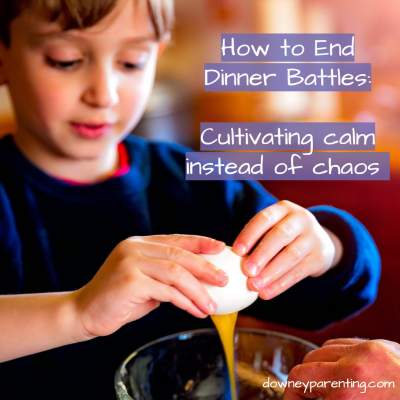
Ahhh, dinner battles. Or for some parents, mealtime struggles. You know the routine: “Sit down. Two more bites. Close your mouth. Chew please. Sit back down. No dessert. That wasn’t a bite. Don’t spit out your food like that. Chew please. Stop bugging your brother. Sit down.”
Now, take a deep breath. Close your eyes and imagine your family nicely seated around the table. Everyone is polite and calm. You discuss your gratitude for the day. Your toddler eats all the vegetables and asks for seconds. “Of course you can have more spinach.” Doesn’t it sound glorious?
And it can be…well maybe not that glorious…but close.
Re-Frame “Battles”
When I hear power struggle I think of a battle or a fight that is about to ensue. And instantly I become anxious and irritable. I don’t like losing (who does?) nor do I enjoy conflict. Plus, I’m competitive…so no matter what a “battle” is a recipe for disaster.
But do power struggles need to be struggles? What if we looked at a power struggle as an invitation for collaboration and cooperation? What if instead of focusing on the ‘battle’ you focused on the ‘peaceful solution?’
“Pick your Battles” aka Compromise
First off, it’s important to recognize that some struggles just aren’t worth it. You’ve probably heard this phrase before. And there’s some truth to it. Remember, sometimes we can just let it go.
This doesn’t mean we let everything go. Of course there are some battles (aka, limits) we need to set and remain firm on, while others we can compromise. A good way to decide which battles to choose are to reflect on your family values. If your child is pushing a limit that violates a value, it’s important to remain firm, consistent and kind.
Preparing for Peaceful Solutions
Mental Preparation
If you’ve been struggling with mealtimes for a while, you might find yourself gearing up for a battle, even before any conflict begins. Pay attention to your body and thoughts. Are you tense in the shoulders or grinding your jaw? Are you having rapid thoughts about how frustrating it will be?
It’s time to cultivate calm. Instead of gearing up for battle, prepare for peace and cooperation.
Create a ritual before dinner. A habitual set of activities that help calm and focus attention. While preparing food, or moments before sitting down at the table, try a calming ritual:
- Listen to uplifting music
- Repeat a mantra to yourself (I feel calm and patient)
- Do a quick meditation
The key is to make it a ritual. So you must practice it consistently, every night.
Physical Preparation
Children, especially younger children, thrive with routine. Set a time for meal times and try to be as consistent as possible.
When possible, include children in meal preparation. Allow kids a voice to choose which vegetable you serve (green beans or broccoli?) or let them help cook. If you’re tense, overwhelmed or concerned you can’t handle a mess-skip this some nights! Instead, allow children to help set the table.
Serving meals “family style” (pots and bowls on the table) and allowing kids to dish out their own food is empowering. It enables kids to figure out serving sizes and practice manipulating larger utensils. Plus it gives them more power over meal time.
Avoiding Land Mines
There are a few “land mines” that can quickly detonate a smooth, calm dinner. Recognizing and avoiding them will help end potential power struggles.
Expectations on WHAT your child eats.
If you’re able to serve your meal “family style” try to have a variety of food available. Encourage your child to put everything on their plate to try, but do not force them to try it.
Expectations on HOW MUCH your child eats.
A pediatrician once told me (and I am forever grateful for his wisdom), trust your child to know how much to eat. Offer the food and a welcoming space, let them decide how much to eat. A child is capable of knowing when they are full and some days a child only needs a little bit of food while other days they might eat everything in sight. Trust them, don’t pressure them to eat. (This does not include children with health/weight concerns that are being addressed by a licensed doctor).
Bribing.
“Three more bites and you can have dessert.” Although in the moment your child is eating more, bribing is counterproductive. Typically the child is more focused on the bribe (dessert) and not focusing on the desired behavior (eating dinner). Next time (and there will be a next time) your child will be waiting for the bribe, instead of eating dinner.
The Peaceful Meal
Now that you have a clear, calm head space, you’ve invited the children to help prepare dinner and you are aware of what to avoid, it’s time for dinner.
Start with Values
Begin your meal by acknowledging the values you have around mealtimes. For example, “We value sitting around the table and sharing our day with one another. We value our time together. You can choose what and how much you eat but you need to stay at the table with us.”
Be Engaging
Create a tradition around mealtime that is engaging. Have everyone share a gratitude or something that made you happy today. Or possibly have a stack of engaging cards to ask each other questions. Or have everyone give a compliment to the person on their left.
Give Grace
Be kind and gentle on yourself and your family. Not all mealtimes will go smoothly, but with persistence and consistency you will notice change. If you find a struggle is continuing, re-evaluate any limits you are setting and see if a compromise is possible.
Creating habits take time. If you are struggling with implementing some of these practices, you are not alone, find support today.


